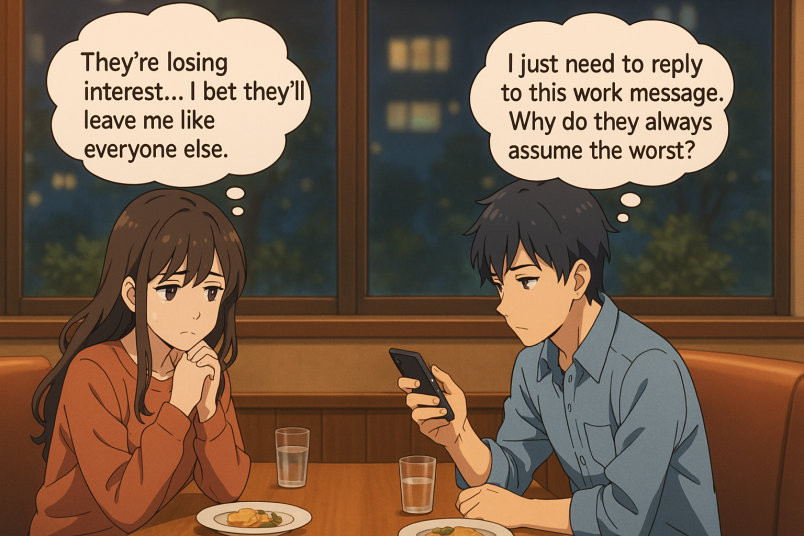How Childhood Trauma Affects Relationships: 7 Ways & How to Deal

Key Takeaways
Marriage.com AI Quick Summary
Childhood shapes so much more than we realize. The laughter, the comfort, the moments of safety… and sometimes the pain, the silence, the things we never fully understood. When those early wounds linger, they can show up later in ways we don’t always expect—especially in love.
A fear of being left behind, a struggle to open up, or even difficulty trusting when nothing seems wrong. It’s not always apparent at first, but it can leave two people wondering why connection feels so hard.
Understanding how childhood trauma affects relationships isn’t about blame; it’s about compassion. Healing begins when we see where the scars are and believe that closeness, trust, and real love can still grow.
What is childhood trauma in relationships?
Childhood trauma isn’t just about “big events” like abuse or loss; it can also be the quiet neglect, the harsh words, or the love we needed but never received. These moments, especially when they happen young, leave deep marks on how we see ourselves and others.
Childhood trauma—whether abuse or neglect—has long-term effects on mental health, increasing risks of anxiety, depression, and anger. Research shows adults with such histories often face marital dissatisfaction, greater emotional distress, and higher chances of difficulties in romantic relationships throughout life.
In relationships, that history can feel like an invisible weight—shaping trust, closeness, and the way we respond to conflict. It doesn’t mean someone is broken… it simply means they’re carrying stories from the past that still need kindness and care.
9 ways childhood trauma affects relationships
Childhood experiences don’t just disappear once we grow up; they often stay quietly in the background, shaping the way we love, trust, and connect with others. Sometimes the effects are subtle, and sometimes they feel overwhelming.
Understanding how childhood trauma affects relationships helps us see patterns with more compassion and less judgment. It reminds us that what happened long ago can influence how we show up in the present, but healing is always possible.
1. Difficulty trusting others
Trust can feel shaky for someone who grew up with broken promises or unsafe caregivers. They may constantly question whether their partner really means what they say, or worry about being let down again. Even in loving relationships, suspicion can sneak in and create distance.
Building trust often takes extra time, consistency, and gentle reassurance. Over time, with patience and open communication, it becomes possible to slowly rewrite the story that trust always leads to hurt.
Here is how to deal with it gently:
- Offer reassurance through consistent actions, not just words.
- Be transparent about your feelings, even in small things.
- Celebrate small steps of trust to build a stronger foundation.
2. Fear of abandonment
When early life included rejection or neglect, the thought of being left can feel terrifying. A partner may cling tightly, read too much into small silences, or react strongly to anything that feels like disconnection.
These fears are not about the present moment alone—they echo the pain of the past. It can be exhausting for both partners, but awareness and reassurance go a long way. Learning that love can stay, even when things aren’t perfect, brings relief.
Here is how to deal with it gently:
- Offer regular check-ins to reassure safety and connection.
- Be patient when your partner reacts strongly to your absence or silence.
- Show through presence that love can be stable and lasting.
3. Struggles with healthy communication
Trauma can shape how people express feelings and needs. Some may hold everything inside, afraid of conflict, while others may raise their voice quickly, believing that’s the only way to be heard. Both extremes can make healthy conversations difficult.
A six-month study at Mano Srijan Counselling Centre, Kanpur, examined communication struggles in 200 couples seeking therapy between January and June 2024. Findings showed most couples faced ongoing issues, with sarcasm emerging as a frequent and damaging pattern in their interactions.
Misunderstandings pile up, and even small disagreements may feel too heavy. With gentle practice, couples can learn to pause, listen, and respond instead of reacting. Communication becomes a bridge, not a barrier, to connection.
Here is how to deal with it gently:
- Practice “I feel” statements instead of blame.
- Slow conversations down when emotions run high.
- Listen fully before responding to create a sense of safety.
4. Emotional reactivity or withdrawal
For someone with unresolved trauma, emotions can swing suddenly. A small argument may trigger deep feelings of shame or fear, leaving the person overwhelmed. Some react with anger, while others pull away completely. To a partner, this can feel confusing or even hurtful.
However, the reactions are often survival strategies from the past. Recognizing this helps reduce blame, and over time, individuals can learn healthier ways to manage emotions while still staying connected in the relationship.
Here is how to deal with it gently:
- Take breaks when emotions feel overwhelming, then return calmly.
- Name the feeling (“I’m scared,” “I feel angry”) instead of acting it out.
- Reassure your partner that you’re not leaving when you need space.
5. Over-dependence or codependency
When safety was lacking in childhood, some people may grow up feeling they can’t survive alone. In adult love, this can mean needing constant reassurance or relying heavily on a partner for emotional stability.
While closeness is natural, it can become overwhelming when one person feels responsible for the other’s entire well-being. Finding balance takes courage—learning to soothe oneself while still leaning on a partner for support. Healthy love allows for both closeness and independence.
Here is how to deal with it gently:
- Encourage self-care practices that build personal confidence.
- Reassure your partner that needing space doesn’t mean rejection.
- Celebrate moments of independence as signs of growth.
6. Trouble setting or respecting boundaries
For many who experienced trauma, boundaries were either ignored or punished. As adults, this can make it hard to know where healthy limits begin. Some may say yes to everything, even when it hurts; others may put up walls that keep intimacy out.
Both extremes can create tension in relationships. Relearning boundaries means understanding that saying “no” doesn’t equal rejection, and that letting someone close doesn’t mean losing control. Respectful boundaries actually protect love, not weaken it.
Here is how to deal with it gently:
- Talk openly about what feels comfortable and what doesn’t.
- Respect your partner’s limits, even if they differ from yours.
- Practice small, safe boundary-setting to build confidence.
7. Difficulty with intimacy and vulnerability
Opening up—whether emotionally or physically—can feel unsafe when past experiences taught that closeness leads to harm. Even in a loving relationship, intimacy may stir old fears. This can cause hesitation, avoidance, or shutting down when a partner reaches out.
It doesn’t mean the person doesn’t care; it means the past still echoes. For couples, patience and gentleness are key. Little by little, safety and trust can help vulnerability feel less like a risk and more like a gift.
Here is how to deal with it gently:
- Create non-pressured moments of closeness, like holding hands.
- Respect hesitation without forcing intimacy.
- Offer reassurance that vulnerability is welcome, not judged.
8. Anxiety and hypervigilance
Some people carry an ongoing sense of “waiting for something bad to happen.” This hyper-alertness often comes from growing up in unpredictable environments. In relationships, it can look like overthinking texts, replaying arguments, or constantly checking for signs of trouble.
Living in this state is exhausting—for both partners. But naming the anxiety helps, and support like therapy or grounding techniques can ease it. For someone dating someone with PTSD, this awareness becomes especially important.
Here is how to deal with it gently:
- Encourage grounding practices like breathing or mindfulness.
- Offer gentle reassurance without dismissing fears.
- Remind your partner of the safety in the present moment.
9. Difficulty managing conflict
Conflict is a natural part of relationships, but for those with childhood trauma, it can feel dangerous. Raised voices or disagreements may trigger panic, withdrawal, or aggression. Instead of working through the issue, the person may shut down completely or fight back hard.
This cycle can make resolution difficult and leave both partners drained. The good news is that conflict skills can be learned, slowly creating a sense that disagreements don’t have to equal rejection or disaster.
Here is how to deal with it gently:
- Keep discussions calm and avoid raised voices.
- Take breaks when arguments feel unsafe or too intense.
- Focus on finding solutions together instead of assigning blame.
Watch this video where Terri Cole, a licensed psychotherapist, reveals the top four communication blockers and offers simple scripts to replace them with healthier, more effective communication:
Can healing from childhood trauma improve your relationships?
Healing doesn’t erase the past, but it softens the grip those old experiences have on your present. With support, self-awareness, and time, love can feel lighter and safer again. Relationships may not suddenly become perfect, but they can grow in ways that once felt impossible.
And isn’t that a hopeful thought?
- Stronger trust: As old fears ease, trusting your partner feels less like a risk and more like a natural part of love.
- Healthier communication: You learn to express needs clearly, replacing silence or conflict with honest conversations that bring partners closer.
- Better boundaries: Healing makes it easier to respect your limits and your partner’s, creating safety without shutting out intimacy.
- Deeper intimacy: When fear loosens, emotional and physical closeness becomes less overwhelming, allowing for tenderness, connection, and vulnerability.
- Resilience together: Facing struggles builds strength; partners learn to support one another without carrying the weight alone.
Healing takes time… but with each small step forward, relationships can become a space where love feels safe, steady, and beautifully possible again.
Moving forward with hope
Healing from the past isn’t easy, but it is possible. What happened in childhood may shape how you see love, trust, and connection—but it doesn’t have to define the rest of your life.
By understanding how childhood trauma affects relationships, you begin to see patterns with compassion rather than shame. And when compassion enters, healing has room to grow. It may take time, patience, and gentle support, yet every step forward opens space for love that feels steady, safe, and beautifully real.
 Tips
Tips
Write your tip or submit a video tip
All tips are reviewed before the publishing.
Share this article on
Want to have a happier, healthier marriage?
If you feel disconnected or frustrated about the state of your marriage but want to avoid separation and/or divorce, the marriage.com course meant for married couples is an excellent resource to help you overcome the most challenging aspects of being married.
Related Articles
Recent Articles
Related Quizzes
 We'd love your feedback!
We'd love your feedback!
 Expert Q&A
Expert Q&A
Ask your question related to this topic & get the support you deserve from experts.



















 Thanks for your feedback!
Thanks for your feedback!